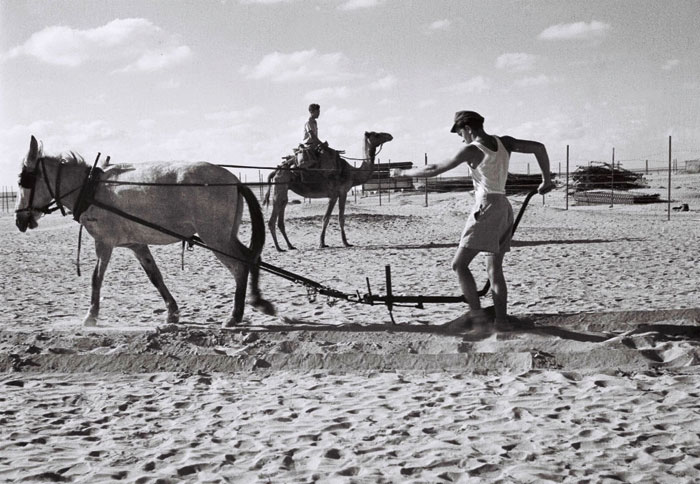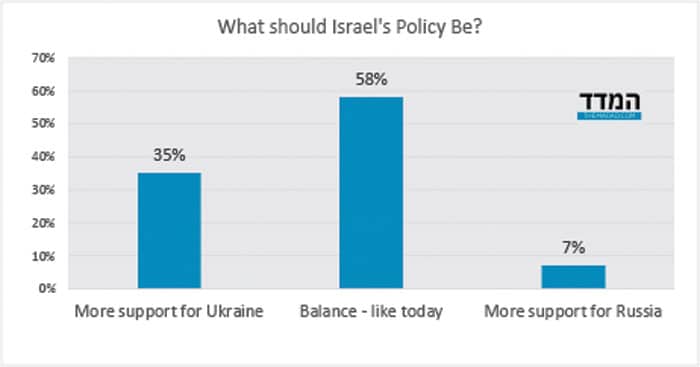 A Jewish pioneering settler ploughs a vegetable field near his cooperative farming community in Kibbutz Urim in the Negev Desert, July 1, 1947.
A Jewish pioneering settler ploughs a vegetable field near his cooperative farming community in Kibbutz Urim in the Negev Desert, July 1, 1947. On Monday morning, the Negev summit of leaders almost disappeared from the public’s view. Foreign Minister Yair Lapid had everything planned out nicely. The site in Sde Boker—David Ben-Gurion’s place of residence — the flags, the blowing wind, the helicopters, the informal setting. Everything, that is, except the unexpected, which in this region is to be expected. When leaders convene to talk about cooperation and development, invariably someone is going to grab a gun and shoot. TV cameras in the Negev were switched off, TV cameras in the town of Hadera, where two terrorists opened fire and murdered two Israeli police officers, were switched on. Lapid and the summit suddenly seemed irrelevant, distant – as distant as Sde Boker.
When leaders convene to talk about cooperation and development, invariably someone is going to grab a gun and shoot.
Even before the latest attack, focusing on the historic summit – attended by foreign ministers from Egypt, Bahrain, Morocco, the Emirates, and the United States, was not easy. Three days before the summit, a terror attack in Beer Sheba ended with four dead. In both terror attacks, the culprits were Arab citizens of Israel. Tension between Jews and Arabs has been a recurring theme in the last year – a year in which, on the one hand, riots and violence were rampant, while on the other hand, for the first time, an Arab party joined the majority coalition.
So that’s the way it is in this schizophrenic region. When there’s good news, there must be bad news. When some Arabs are integrating, politically speaking, some Arabs are also rioting or committing attacks. It’s not always easy to tell which of the two trends is the more dominant. And the same holds true for news coming from the south, the Negev. When some Israelis and Arabs sit together to have talks with the serene desert as background, other Israelis and Arabs (mostly Bedouin) are caught in a fight over Israel’s ability to rule the desert.
The Hebrew word that is often used to describe the trouble with the Negev is “Meshilut” – governability, or in this case, the lack thereof. There are not enough police to control the rate of crime in this region; there’s not enough determination to settle the Bedouins on land that they own, rather than wherever they want to reside. The Negev is about half of Israel, but many still feel it is our Wild West, where laws don’t always apply. Ask almost every Israeli, and they will tell you that it’s time the government do something about the Meshilut in the Negev. Ask what exactly ought to be done, and the response begins to vary. In a cabinet meeting on Sunday, two ministers fought vociferously over a plan to build five new Jewish settlements in the northern Negev. In previous months, the Arab party of the coalition, the Raam party, whose main pool of voters is Bedouin, blocked initiatives to deal more aggressively with illegal Bedouin activities.
Ben-Gurion’s dream for the Negev, as a blooming desert, the one that Lapid wanted to emphasize as he gathered foreign leaders for a show of unity, is not yet fulfilled. There are blooms, yes, but alongside the bloom is a bag of unresolved trouble, which is also a fitting description for the summit of leaders. It was a historic show of legitimacy, as Arab countries sent their dignitaries to be seen publicly socializing with Israelis, on Israeli land, not far from where Israel’s founder is buried. It was also a show of Middle Eastern leaders beginning to prepare for a more dangerous, more volatile region, in which Iran – emboldened by the lack of American resolve – is getting stronger and more daring. Imagine that: a summit in which Israel and the Arabs are on one side, complaining and protesting, while U.S. Secretary of State, Antony Blinken, is on the other, attempting to explain a U.S. policy for which no good explanation has been given thus far.
When the summit gathered, there was some speculation that it could become a place of confrontation with the U.S. That did not happen, maybe because of the calm setting, or maybe because this is not Lapid’s mode of operation. Thus, the event was a success. The food was good, the atmosphere cordial, the pictures charming, the sense of history being made in the air. But ask what exactly was achieved and the response becomes somewhat vague. A decision was made to have another such meeting next year. Which reminded me of the Purim we just celebrated, and Queen Esther’s first banquet. Remember her achievement? Let the king and Haman come again, the next day – to deal with the actual problem.
Something I wrote in Hebrew
Sometimes I write about the everyday lives of Israelis. Things such as: do they have pets?
How many of us have a dog or a cat at home? The answer is, about a third. Much less for Arabs, much less for the ultra-Orthodox, more for the rest of us. But even in the case of the rest of us, Israel is far from being at the forefront of having pets. In the United States, more than half of the population has a pet. In Israel, even among secular Israelis, who tend to have more pets, the share does not get as high as fifty percent. Still, the level of tradition and religiosity is the best indication for whether people are likely to have pets. The more religious Israelis are, the fewer pets they have. Among the ultra-Orthodox, this is an almost non-existent phenomenon. Among the religious, it exists only among a minority of about one-tenth.
A week’s numbers
Israel’s heart is with Ukraine; Israel’s mind is more with Israel’s need to balance its policy and not alienate Russia.

A reader’s response:
Naomi Eshron wrote: “I don’t understand why you call the backwardness of the Haredi world a success – it is a disaster for Israel!”. A quick response: weirdly, both can be true, a success for them that is a challenge for Israel (a “disaster” is premature and too strong).
Shmuel Rosner is senior political editor. For more analysis of Israeli and international politics, visit Rosner’s Domain at jewishjournal.com/rosnersdomain.





















 More news and opinions than at a Shabbat dinner, right in your inbox.
More news and opinions than at a Shabbat dinner, right in your inbox.